Australian Tumbleweeds
(Bazura) Project Your Voice
Press release time!
THE BAZURA PROJECT’S RADIO FREE CINEMA
THE TV SHOW ABOUT MOVIES IS NOW A RADIO PROGRAM RELEASED AS A PODCAST
On 29 September 2011, The Bazura Project’s Guide To Sinema, a comedy series devoted to exploring cinematic sins, began its extremely limited run on the ABC. Now, exactly ten years later, the creators are back with their most exciting project yet: a press release. But it’s a press release that’s promoting their next thing, The Bazura Project’s Radio Free Cinema.
As many will doubtless recall, The Bazura Project’s Radio Free Cinema was a huge hit, broadcast on an unspecified radio station an indeterminate number of years ago. Now, the recordings that everyone had believed (and hoped) were lost forever have been uncovered, digitised, cleaned up, edited for slander, and are now ready to be released on a podcast platform where they can be heard again… for the first time.
Over six thrilling and definitely factual instalments, The Bazura Project’s Radio Free Cinema will explore every possible aspect of the film world, including:
*interviews with the film industry’s best and brightest, including: Aussie soap star-turned-Hollywood headliner, Amelia Bell-Jarman; the Oscar-winning producer of some of cinema’s least challenging mid-brow works, Catarina Rice; achingly-dull minimalist Hungarian film composer Máté Lantos; and studio janitor from Hollywood’s golden age, Jerry Schutz
*exclusive first-listen trailers for the most exciting new high-concept thrillers, low-concept romantic comedies, poorly-conceived fantasy adventures, crowd-placating dramas, and overstimulating kids’ films
*original songs from your favourite soundtracks and never-before-heard music from your least-favourite unreleased movies
*dispatches from all around the world, including: an exclusive Sundance Film Festival premiere after-party; the world’s greatest voice coaching academy on an island in the Baltic Sea; and a glamorous and exceedingly-morbid awards ceremony in the heart of Alaska
plus much, much more
“It was always our plan to air six poorly-rated episodes on the endlessly-rebranded ABC2, disappear into obscurity for a decade, and then return with a six-episode podcast that wouldn’t make us any money,” says co-creator and co-presenter Lee Zachariah.
“The presently-oversaturated market of podcasts presented us with the perfect opportunity to release our own,” says co-creator and co-presenter Shannon Marinko. “If you manage to find it, and enjoy it, it’s probably someone else’s.”
The show will feature an overstuffed cast that includes Tom Ballard, Rusty Berther, Kristy Best, Robyn Butler, Rhonda Burchmore, Santo Cilauro, Marc Fennell, Tim Ferguson, Abe Forsythe, Bob Franklin, Francis Greenslade, Tosh Greenslade, Roz Hammond, Stephen Hall, Andrew Hansen, Peter Helliar, Tegan Higginbotham, Ming-Zhu Hii, Adam Hills, Claire Hooper, Wayne Hope, Dan Ilic, Laura Hughes, Mark Humphries, Nazeem Hussain, Ed Kavalee, Christopher Kirby, Colin Lane, Tommy Little, Cassandra Magrath, Tony Martin, Shaun Micallef, Rhys Muldoon, Brian Nankervis, Celia Pacquola, Geraldine Quinn, Ben Russell, John Safran, Kat Stewart, Emily Taheny, Chris Taylor, Dave Thornton, Toby Truslove, Michael Veitch, Cal Wilson, and many, many more.
The six-part series begins on October 5 on Apple Podcasts, Spotify, Stitcher, Google Podcasts, Radio Public, or directly via our website: bazuraproject.com/radiofreecinema
The trailer is available to hear now via this link.
We’ve been trying to remember if any other Australian television comedy shows have directly turned into podcasts, and we’ve been unable to think of any – ground-breaking work here, Bazura. Also this sounds pretty funny and that all-star line up is definitely impressive, so consider us sold!
So long as we don’t have to actually pay money for it, which currently seems to be the case.
Too sexist for this shirt
Australia’s Sexiest Tradie took a bit of a turn last week, ditching The Office-esque comedy of awkwardness, and the toilet humour, to delve a bit further into the toxic masculinity of lead character Franky Wood.
Previous episodes have firmly established that Franky is a massive tool – selfish, disrespectful, a misogynist – and generally the sort of bloke who shouldn’t have friends or a family who cares about him…yet somehow does. But in episode four things changed. What had been yet another comedy about a dickhead who people react to with shock and distaste, became a semi-drama about awful men. And not one that ended with the awful man in question getting his comeuppance.
Episode four opened with the announcement that Franky and long-time girlfriend Leanne (“Hammer”), who’d broken up in a previous episode, were suddenly back together – and engaged. Then we discover that thanks to one of his videos going viral, Franky was in the lead to win Australia’s Sexiest Tradie. Cue the arrival of Summer, a fellow Australia’s Sexiest Tradie contestant, who Franky fancies, manipulating Franky into helping her stay in the competition by Instagramming his support for her. Franky, who thought he might finally be in with a chance with the good-looking Summer, let her take over his social media.
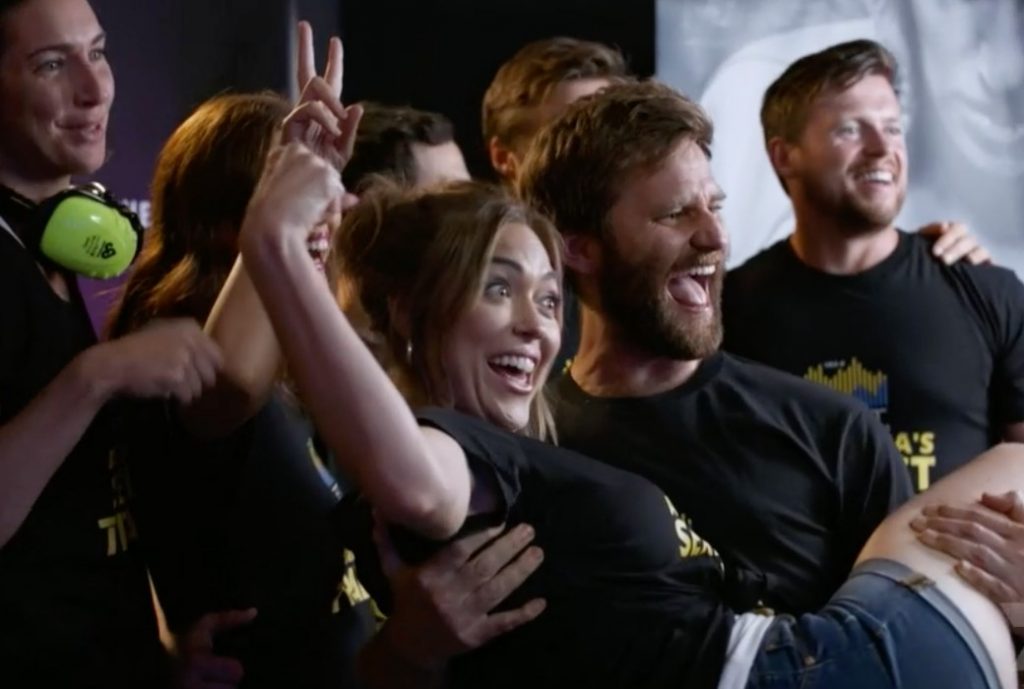
Later, Summer joins the Wood family for a special dinner to celebrate Franky’s engagement and his success in the competition. But things get awkward when Leanne gives a speech about how happy she is to be engaged and Franky, with one eye on Summer, denies their relationship entirely. Mum Barbara, quite rightly, asks Franky why he’s messing Leanne around.
We’re used to Australia’s Sexiest Tradie being uncomfortable viewing, but mainly in the sense of the awkward comedy it generates. Franky Wood is an awful man but in earlier episodes, we could laugh at his awfulness and thus tolerate him. In episode four, the dynamic changed, and the show became uncomfortable in the sense that it was traumatic to watch the way Franky treated Leanne. And near impossible not to want to turn off the TV and never watch this again.
This is bad news for a show that’s meant to be a comedy. It’s also a testament to how hard it is to take a big, complex and difficult topic like toxic masculinity and use it as the basis for a sitcom. There probably is a way to do this well but Australia’s Sexiest Tradie hasn’t managed it. It was too ambitious an idea for this show, which has only really succeeded at toilet humour and cringe comedy. It’s also easily misinterpreted by the audience as condoning toxic and abusive behaviours.
It doesn’t matter that Franky kinda got what he deserved when Summer left him the second after she made it into the final of the competition. The fact that Franky was able to hurt his vulnerable fiancé in the meantime, and still be the hero of the show, makes it look as if his behaviour was okay. When it absolutely was not.
Vale Rosehaven Rest in Power edition
Rosehaven is over. It takes with it yet another era in Australian comedy. Not a particularly funny era mind you, or even an especially memorable one; remember that episode where they had the banter then a shot of the Tasmanian countryside then we got some more banter? Good times.
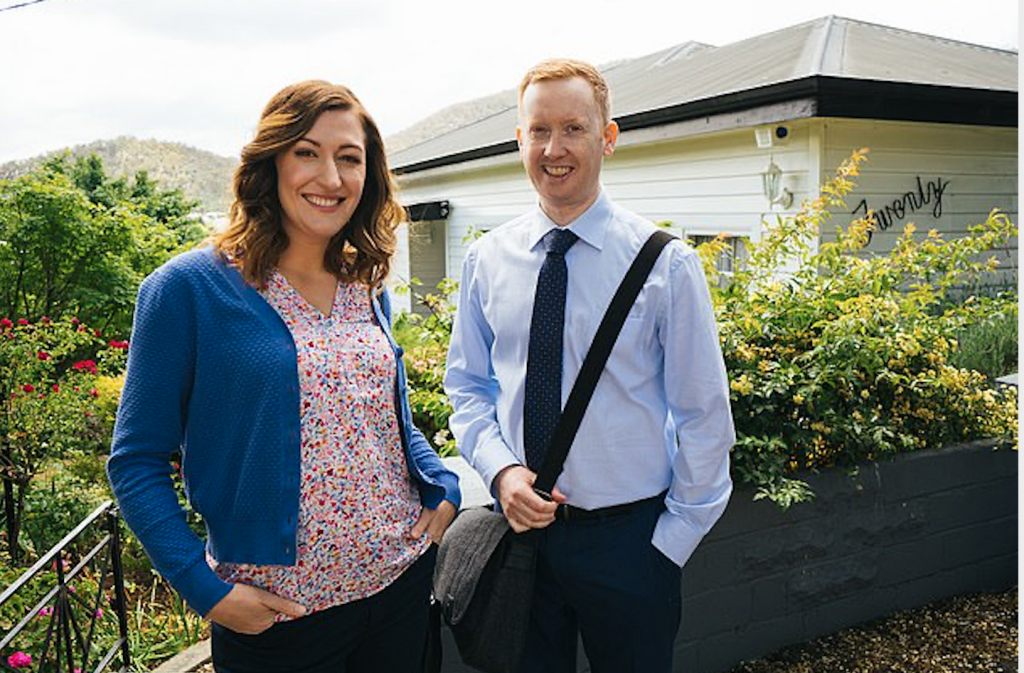
Seriously though, when even articles praising Rosehaven are calling it “a soothing balm for anxious times” and “a fresh air-filled world where the pace is slow and the stakes are low”, you have to wonder: is there anything this show did that couldn’t be done faster, cheaper and more efficiently by simply closing your eyes? Here’s a headline for you: AUSTRALIA’S FAVOURITE SCREENSAVER ENDS AFTER FIVE SEASONS.
(to be fair, that article does also call Rosehaven‘s humour “safe” and says that it was a show with an “aversion to making a statement about anything”, so it’s not like anyone’s confusing it with Wonder Showzen)
Toxic levels of snark aside, the demise of Rosehaven really is the end of an era, in that it was a sitcom that started out as a showcase for its two leads and just kept on going down that path until it ended up as basically The Celia and Luke Show. Apart from “sarcastic white man with big hair and a laugh like a deflating balloon geez Question Everything is hard to watch”, the ABC doesn’t really deal in comedy types any more: Fisk was the last sitcom where the lead – as a performer – was any kind of selling point, and even there Kitty Flanagan was largely playing against type.
The good news was, Celia Pacquola and Luke McGregor were a charming and fun duo to spend half an hour with. The bad news was, the rest of the show was so lightweight it might as well have not been there. We’ve said it before, but here we go again: why weren’t they solving murders? It could have been the exact same show only someone is found dead in the first 90 seconds and at the end of the half hour we weren’t left with a hollow, empty feeling and a clock showing us that every single person on the planet was thirty minutes closer to death.
Sure, a show that combined a couple of nice comedians and a sack of cash from the Tasmanian tourism board was never going to be anything but nice. But you can be nice and still have things happen! You can even be nice and have jokes! At least one recent interview with the stars had them seeming a little perplexed that Rosehaven never took off overseas and with the rise of “sitcoms” based on nothing but “hey, this nice guy seems really nice, let’s hang out”, who can blame them.
There’s nothing intrinsically wrong with television where having your audience fall asleep before the twenty minute mark counts as mission accomplished, but Australia just doesn’t make enough decent comedy that we can afford to have forty episodes of a sleeping pill end up “beloved by critics around the world“. There have been more episodes of Rosehaven than every laugh-out-loud Australian sitcom of the 21st century put together: that ain’t right.
So aside from Anthony Morgan, who was a constant comedic delight across all five seasons and deserves his own spin-off (or a prominent role in every single series filmed in Tasmania from here on out), is there anything we’ll miss now that Rosehaven‘s gone? It’s hard to say, considering we hardly noticed it when it was on a television right in front of our eyes.
Let’s put it this way: do they still sell calendars with pictures of the Tasmanian countryside? We’ll stick a photo of Pacquola and McGregor in front of the landscape for August and it’ll be like Rosehaven never left.
Australia’s latest mockumentary
You could be forgiven for thinking that Australia’s Sexiest Tradie (which airs on 7Mate after Fat Pizza: Back In Business) is the real deal: an actual tradie being followed by an actual documentary crew. But in fact, the show is the creation of actor Rick Donald (Home & Away, Wentworth), who also plays the lead character Frankie Wood.
Frankie is a plumber who lives with his parents and girlfriend but wants to become an actor. The best route to fame, he thinks, is entering a local radio competition to find Australia’s Sexist Tradie. Somewhere along the way, a documentary crew start to follow him and voila, he’s on his way to superstardom.
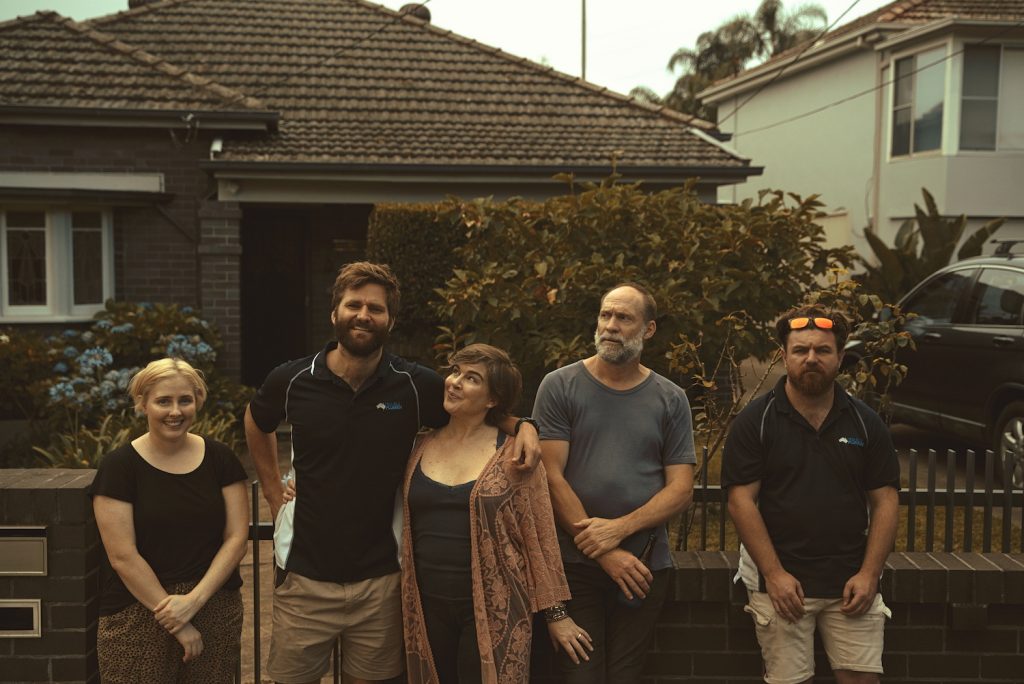
Or is he? Because he’s clearly a misogynist, homophobic tool with no discernible talent other than stupidity and insensitiveness and that doesn’t play so well in 2021. Out on a job at the house of a pregnant woman with a sleeping baby, he refuses to turn down his radio so as not to wake up her child and makes insensitive, sexist comments about her breasts. Later, when forced to apologise to her by his boss (Peter Phelps), he finds it almost impossible.
At the radio station, when he meets the other contestants, he finds himself torn between a desperation to win and a strong desire for hot female contestant Summer (Annabelle Stephenson), who gives him an erection every time he sees her. This leads to some painful manscaping and his attention-seeking appearance at a competition photo shoot wearing only Speedos…quickly followed by the inevitable erection when he watches Summer’s sexy photo session.
Frankie, you might say, isn’t the type of man capable of forming a mature relationship or behaving in any way like an adult. Within hours of setting eyes on Summer, he’s dumped long-time girlfriend Leanne (Briallen Clarke), a sweet-natured doormat who’s endured his idiocy and his sexist nickname for her, Hammer, for years. Meanwhile, Frankie starts ordering about his best mate Grub (Jason Perini) and making him film his social media videos. One such video, in which Frankie adds about half a jar of Nescafe to a bottle of iced coffee, then skulls the lot, leads to a funny, albeit pretty gross, sequence at a customer’s house.
Generally speaking, the gross-out comedy is the funniest stuff in Australia’s Sexiest Tradie. Most of the other laughs come from scenes in which Frankie says something idiotic and everyone around him pauses and looks shocked and uncomfortable. And while this can be funny, after 20 years of mockumentaries and sitcoms chock-full of roughly these kinds of jokes and situations, the fart gags and gross-out material are welcome.
One way in which Australia’s Sexiest Tradie is a bit different to the likes of The Office and the work of Chris Lilley though, is that it digs deeper into why the main character is like he is. Frankie’s Dad Terry (Steve Le Marquand) is equally insensitive, sexist and incapable of basic decency to others. This gives us both an insight into the line of toxic males that gave us Frankie Wood but also gives the makers of this show a slightly different way of taking the piss out of this type of bloke. Although, this also means that Terry’s treatment of wife Barbara (Pippa Grandison) is every bit as upsetting as Frankie’s treatment of Leanne.
The female characters, we hope, will leave these idiots, and go off to lead independent, more fulfilling lives (although for the comedy to work they’ll have to stay put). Meanwhile, there are three more episodes to go before we see whether Frankie will become Australia’s Sexiest Tradie or remain just another tool in the toolbox.
Might as well Question Everything
It’s not a good sign when the ABC starts promoting your replacement when you’ve still got weeks to go. And what’s this?
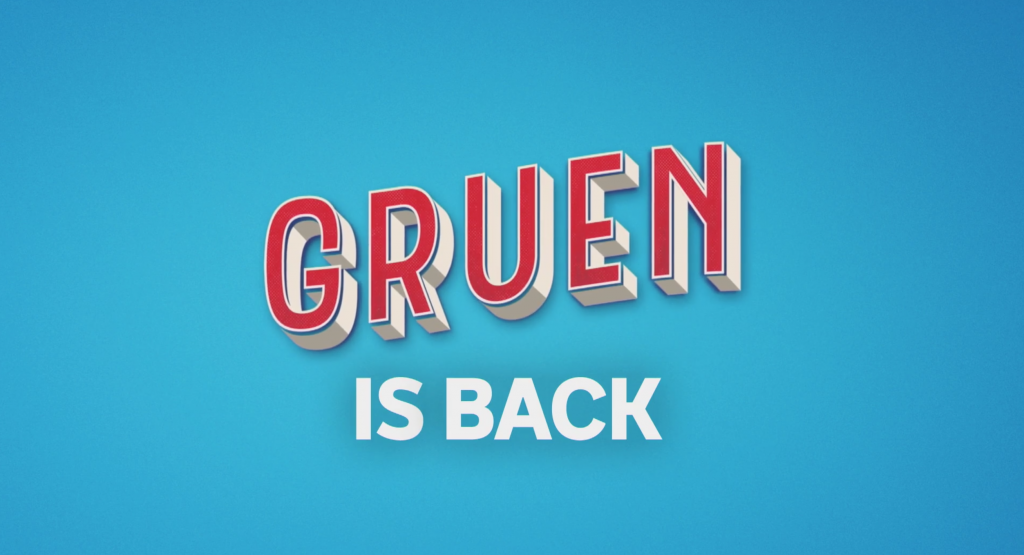
Okay, it’s shit news, but it’s no surprise – this is sizzle for a return next year though, right?
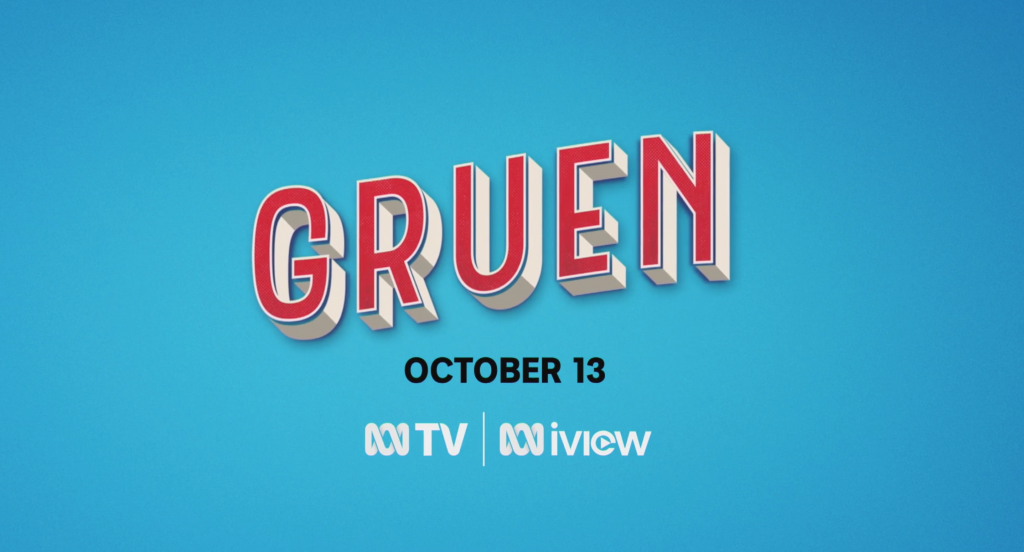
Wait, so they’re advertising it now even though it’s not going to air for a full month? The ABC only ever does that when they’ve put a dud in a vital timeslot and want viewers to keep tuning in thinking they’re going to be getting a better show. Which they will be… in a month.
Though “better” isn’t quite the right word, as Question Everything has gone from being vaguely Gruen shaped to straight-up Gruen News, the show nobody asked for. This week’s episode featured a story on how technology is being used to create fake ads; that’s a Gruen segment. When you have Wil Anderson saying to a panelist “Aaron, you’ve got something to sell us?”, you have an episode of Gruen.
The downside of all this – aside from having more Gruen – is that the excuses are already falling into place. Anderson’s already spoken publicly about the series’ difficulty when it comes to getting panelists. Obviously the show would have been a hit if they’d been able to get the same old smarmy ABC hacks in, right?
Here’s the problem with that version of events. The panelists, while a bit rough around the edges, have pretty much been the only part of Question Everything that’s made it worthwhile. All that other stuff left over from Gruen? Not so flash hot.
Gruen works (yeah yeah “works”) because it features a group of experts talking about an area they’re seemingly knowledgeable about. Question Everything was always going to feature comedians talking about the news, an area they’re not particularly knowledgeable about unless they’re Chaz Licciardello and he already has his own show that does exactly what this is supposedly doing only better because literally every other show on Australian television doing news is doing it better because IT’S NEWS AND EVERY NETWORK HAS AN ENTIRE NEWS DEPARTMENT THAT HANDLES NEWS.
(well, maybe not 7Mate)
The only time Question Everything gets it right is a): by accident and b): in spite of, not because of, the format. The guests – again, best thing about the show – are just there to reply to Anderson’s tired joke prompts; the moment this week where one guest spoke directly to another was about as surprising as things get. And when “conversation” is the best thing your show has to offer an audience, fuck off.
Question Everything was a bad idea from the beginning and trying to pretend the only good thing about it is why it failed is the kind of bullshit hack self-serving political move you get from entrenched company men looking to save their own backsides. Here’s a serious suggestion: why didn’t they go down the QI route with this and get a serious(-ish) news person to host (not Annabel Crabb, but in that direction) and let the comedy guests provide the comedy?
Oh right, because then we wouldn’t have Wil Anderson looking pissed off as the kids make jokes and he’s left frozen-faced like a school teacher trying not to bark “I was cool before you were born”… not realising that the sad thing is that he’s right.
The moral of this story is simple: the ABC should make more new comedy showcases, less “what if Gruen but about ____?” and maybe consider leaving news coverage to the entire channel of news coverage they’re already paying for.
Iggy & the opposite of Ace-d it
Just when you thought only the ABC could make dull, unfunny dramedies about self-indulgent young people along comes SBS with Iggy & Ace. Although, to be fair to SBS, Iggy & Ace isn’t also a parody of woke culture. So, points for having an original take on people in their 20s!
Iggy (Sara West) and Ace (Josh Virgona) are two gay besties who spend most of their spare time drinking heavily. But while we get hints as to why Iggy chugs it down (her Mum threw her out when she was a teen, she’s struggled with her sexuality), Ace seems to drink with Iggy more because he’s been swept along by her tide. So, when Ace starts having chest pains because of his boozing, he very sensibly joins a local AA chapter. But will his decision, which makes Iggy angry and jealous, mean the end of their friendship?
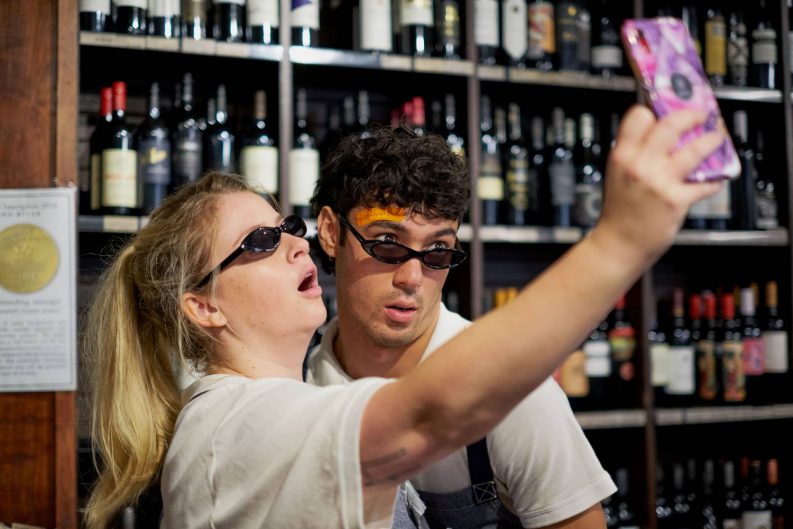
This sort of premise, about a psychologically damaged young woman who can only deal with the pain by drinking, might work better as a dramatic film or literary fiction, where the reasons for Iggy’s poor decisions and bad behaviour could be better explored. But across six 15-minute episodes, we don’t really get the full picture.
We can’t sympathise with Iggy because we don’t find out enough about her backstory, we can’t care about her because 99% of the time she comes across as a selfish, irredeemable fuckwit, and we can’t laugh at her because there are almost no funny moments in this show. Not that you can wring a lot of laughs out of “people get pissed and stuff up” without going down the Absolutely Fabulous route of slapstick.
The one or two gags we do get per episode are largely incidental to the main plot, such as the running gag about the members of the AA group calling token straight member Rachel (Megan Hollier), Jessica. This is funny, but for a show sold as a comedy, it’s pretty unsatisfying that this is the limit of the laughs.
Even solid comedy players like Roz Hammond (Mad As Hell) as AA group leader Gwen and Dalip Sondhi (Frayed) as Iggy and Ace’s dealer and gay mentor Otto, don’t get much funny to do. Which seems like a waste of their talents, really.
Also, what’s Ace’s deal? He’s one of the two most important characters in the series yet we find out almost nothing about him.
Overall, Iggy & Ace feels like it needed to go through another couple of drafts. Some of the fundamentals were there – a solid premise, interesting incidental characters, people in crisis, a good cast – but it lacked that extra polish that would have made this a better drama and a funnier comedy.
They’re Big and They’re Cheezy
Fat Pizza is back! Well, kind of. There’s a pizza shop, Bobo (John Boxer) waves around a chainsaw, Sleek the Elite (Paul Nakad) is shown in a couple of clips that quite possibly could have come from last season, and there’s yet another version of that “subwoofa” song. What more do you need?
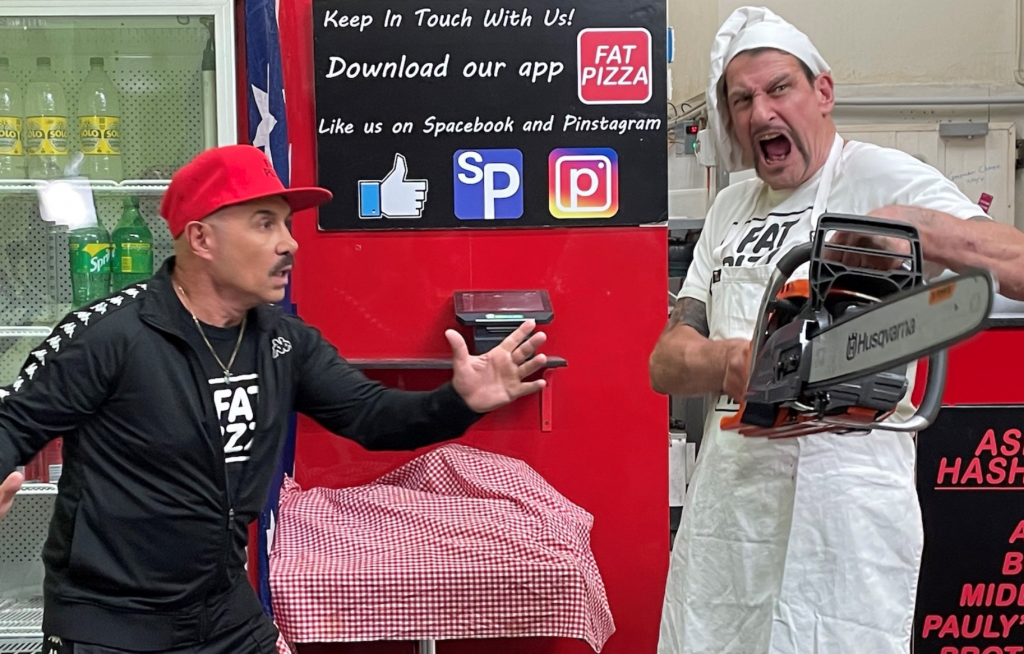
Before anyone can say “I dunno, some comedy?”, let’s remember it’s Fat Pizza we’re talking about here. Oh wait, wasn’t Fat Pizza the one halfway decent franchise from the House of Paul Fenech? While Housos started shit and fell apart from there, and Swift & Shift was just Pizza with slightly fewer ethnic stereotypes, Fat Pizza used to be… okay, not good, but not completely shithouse.
(“Not completely shithouse” – Australian Tumbleweeds)
What made the original Pizza and Fat Pizza work – yeah, yeah, “work” – was that it featured a cast of mildly distinct characters. That meant there were subplots. It wasn’t just Fenech running around bumping into various comedy grotesques for a scene then running off to the next scene featuring a new comedy freak. Which is all Fenech’s been making for the last few years now and much like the pizzas, it’s getting pretty stale.
Possibly this extremely dull plot structure has been forced on him by coronavirus. Considering the first episode of the all new Fat Pizza features a bunch of crowd scenes, possibly not. As a creative choice it’s a bit strange, but this is a series that has to spend half of the first episode undoing the cliffhanger from the previous season, which also had to spend half its first episode undoing the cliffhanger from the season before that, and that season opened with Fenech’s character escaping from a sex dungeon after fifteen years. Guess you got to follow your muse.
Okay, so there’s less plot, less regular characters, less new characters (Pauly doesn’t even hire any new staff for the pizza shop this time) and not as many “big name” cameos; what’s left? Well, there’s an extended scene where Pauly wrestles with a roid’ed out white supremacist woman who doesn’t like pineapple on her pizza but who does have a massively enlarged clit due to the steroids. Does Pauly win the fight by biting it? Hey, if we had to watch it, you have to read about it.
It’s possible some of this could be funny in an “I can’t believe what I’m watching” fashion, but Paul Fenech has been doing this stuff for so long now that even when he’s shocking there’s no shock left. A shocking episode of Fat Pizza would (have some jokes? – ed) be one where the comedy was based even slightly on characters rather than Fenech opening a door and being confronted by some “outrageous” character or activity for the sixth time in twenty minutes.
The first Fat Pizza movie was on television a few months ago, and while the bar for Australian comedy films is pretty low – thanks in part to Fenech’s later efforts – it wasn’t all bad. It was basically a series of skits, but they weren’t all the same skit. The ethnic stereotypes seemed at least slightly grounded in reality (the African Gangs in the current run of Fat Pizza, not so much), it took wild turns that didn’t always involve someone getting their dick out, and there was more going on than just Fenech running around pulling faces.
Fenech’s forgotten the ingredients that made Fat Pizza work. All that’s left now is sour dough.
Vale The Moth Effect
The final episode of The Moth Effect was released on Amazon on Friday, and while it had some good moments, it’s not a show we will particularly miss. This was a show which promised a lot but mostly failed to deliver. It was a sketch show where the makers (mostly) didn’t manage to get beyond a funny premise. They had a good solid idea for a sketch and…that was it. They didn’t start with their good solid idea and build on it, and they (mostly) didn’t manage to write lots of funny lines in their sketches. They had a funny idea, and that was all you got. One idea and one laugh per sketch. That’ll do, right?
Take the interrogation sketch in episode six. A man is being interrogated by the cops in a run-down warehouse, but the cops can’t extract the information they need from him. Enter Woke Cop, who tries to wear down the man by being over-empathic and sensitive to his needs. And after that doesn’t work, enter Stand-Up Comedy Cop, who bombards the man with piss-poor material until he’ll do anything to make it stop. This sketch had about four laughs in it and went for about as many minutes, with most of those laughs coming from the piss-poor stand-up material. And if you’re wondering why The Moth Effect didn’t just scrap the interrogation premise and give us a piss-poor stand-up routine instead, then so are we. It would have been funnier.
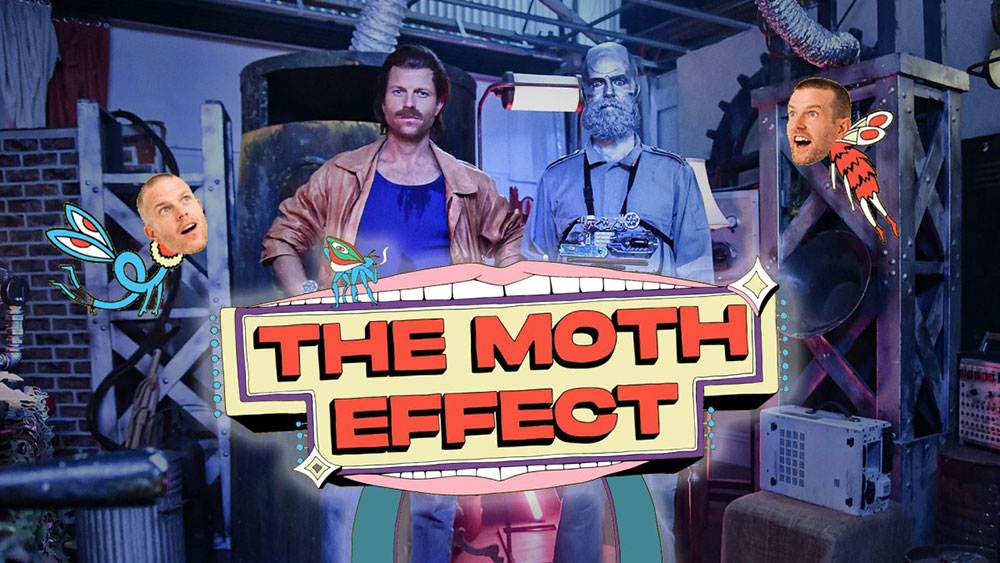
But who needs actual laughs when you can make obvious points instead? The Moth Effect had plenty of sketches referencing topical issues and concerns, such as the lack of government action on climate change (which is a fair point to make but hardly a mirth fest). Another theme we saw several times was woke and cancel culture, such as in the parody game show ‘Who Gives a Shit?’, in which contestants had to answer questions on what does and doesn’t matter. ‘Who Gives a Shit?’ took pot-shots at internet activists, online conspiracy theorists and the ultra-woke but failed to make a solid satirical point beyond “they’re all idiots”. It wasn’t even particularly funny.
Where The Moth Effect was on safer ground was when they parodied TV shows. Several quick-fire sketches concerned an inane breakfast show called ‘Sunnyside Up’ in which a reporter doing a live cross reminded the fun-loving hosts back in the studio of some bleak truths. While the final episode of the series included a solid parody of various reality shows (The Bachelor, Bachelor in Paradise, Survivor, MasterChef, Big Brother) in which the usual fame-hungry types and pointless influencers competed to fuck a television. Partly it was the instantly recognisable premise that made these parodies funny (the high-concept sketches could sometimes be a bit obtuse), but mainly it was the high-ish gag rate that made these enjoyable. Sketches with more than one joke in them! What an idea.
If The Moth Effect wants to make a better second series, it needs to concentrate more on making us laugh than telling us stuff we already know. Yes, the environment is stuffed and the government doesn’t give a damn. But you’re a sketch show, make us laugh about that issue or don’t bother with it.
Nerves Are Getting Frayed
Press release time!
The wait is nearly over… Frayed season two launching this month
It’s time to grab the shoulder pads and head back to the 1980s once again. The highly-acclaimed, six-part comedy series Frayed, written by and starring the multi-talented Australian comedy star Sarah Kendall, is set to return to ABC TV and ABC iview from Wednesday 29 September at 9pm.
Season two kicks off in London, where the lives and secrets of the Cooper family continue to unravel as they deal with the ramifications of season one’s explosive finale, and their Australian past insists on catching up with them.
Having made it out of Australia, Sammy (Sarah Kendall) and her kids, Lenny (Frazer Hadfield) and Tess (Maggie Ireland-Jones), find themselves living in a tiny London flat, as Sammy frantically tries to prove that her lawyer, Rufus (Robert Webb), stole her house. Barely able to make ends meet working in ‘exhaust management’ (she’s a secretary in a muffler repair shop), Sammy is desperate to find a way to reclaim her opulent London life. She also needs to keep her kids far away from Australia and the truth about what happened to their neighbour, Terry.
Meanwhile back down under in Newcastle, an ambitious cop named Fairbank (Hamish Michael) has been brought in to head up the missing persons case and simply does not believe Terry would just disappear. With Jim (Ben Mingay), Jean (Kerry Armstrong) and Abby (Alexandra Jensen) trying to keep their secret hidden, and con artist Bev (Doris Younane) lurking on the scene, it’s only a matter of time before the truth catches up with Sammy.
Frayed debuted on ABC TV in Australia and on Sky in the UK in October 2019. The series was nominated for five AACTA Awards and Kendall also garnered a BAFTA Television Award nomination for Female Performance in a Comedy Programme.
Let’s go out on a limb for once: good news! Season one was a rare example of a drama that used comedy well (or vice versa), and having it back on our screens is a pleasant reminder that Australian scripted television can reach beyond the boundaries of Fat Pizza, which is also back next week but let’s worry about that later.
All My Friends Are Unbearable
All My Friends Are Racist is the kind of show that can easily slip under the radar, largely because it’s the what – third? fifth? – Australian “youth” comedy of recent times in which a pair of unbearable twenty-somethings swan around using social media and woke attitudes to justify their self-centered behaviour. It’s a classic comedy set-up, though not until you remove the words “classic” and “comedy”.
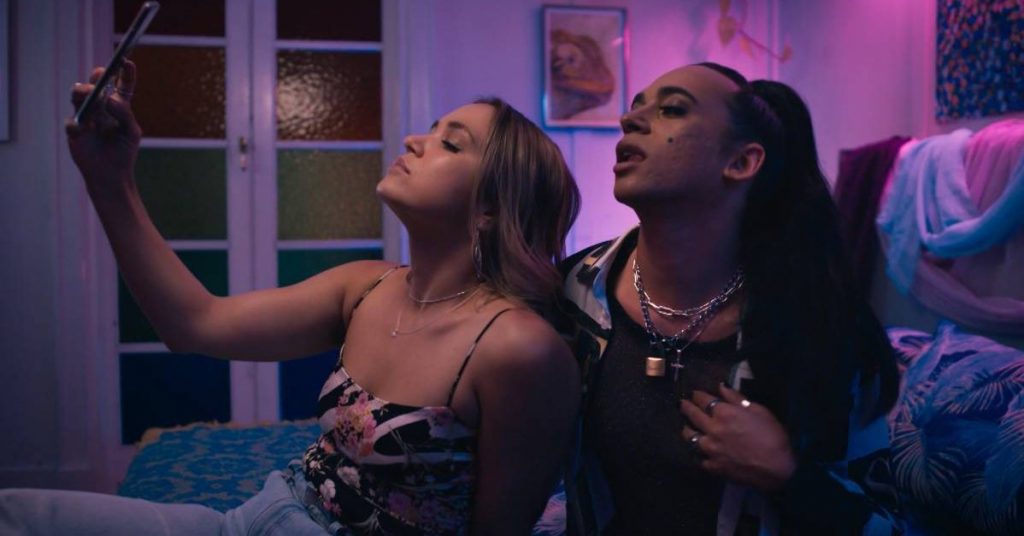
What makes this different from the recent Why Are You Like This and the upcoming Iggy & Ace and possibly another half-dozen proposals that just got funding is that here the two obnoxious social-media-obsessed hard-partying twenty-somethings at the heart of the show are 1): indigenous and 2): slightly more obnoxious than usual, thus making it slightly easier to call it “a comedy”. Because the only joke any of these shows have to offer aside from the idea that references to eating ass are automatically funny / edgy is “omg these people are awful!” And then the realisation that there’s five and a half more episodes to go sinks in.
(“unhealthy friendships” doesn’t seem like the only thing that defines the youth of today. Yet if you’re making a government-funded Australian sitcom aimed at anyone under 30, that’s the only character dynamic you’re allowed. Is every old fart on every commissioning board worried that their kids aren’t playing enough sport or something?)
Last week’s first episode (the whole season is currently available on iView) saw Casey the gay Aboriginal influencer (Davey Thompson) and Belle the Aboriginal trainee lawyer (Tuuli Narkle) get #cancelled after their serial killer wall documenting all their friends’ racist / sexist / politically dubious failings was exposed at their latest party. Turns out exposing racism only makes you more popular online, but can they survive on likes and follows alone?
All My Friends Are Racist is the television version of those online comedy articles where the headline is the joke. The actual episode fills in the details of the synopsis, but it’s the synopsis that contains the “comedy”. In fact, watching the episodes themselves makes the show less funny, because while the performances are definitely big enough to get the point across, they’re also…
Okay, it seems weird to have to say it out loud, but for decades one of the rock-solid cornerstones of comedy was the double act. You had two characters: one was overtly funny, the other set up the gags and reacted to them. It worked. It got laughs. It was the basis for many of the most successful comedy teams ever. And yet when it comes to Australian comedy, all we get are shows where two functionally identical characters fight over the same tiny scrap of unfunny ground.
There are two main characters in this show and they are for all comedic intents and purposes identical. Sure, one is slightly more flamboyant, the other slightly more reserved; they’re still basically the same character. The cast do a good job of bringing the characters to life; they’re still the same character. This isn’t Frasier, where an ensemble cast balances out the identical leads. Why have 100% of your core cast playing the same character?
This week’s episode lifted its game a little with the introduction of Casey and Belle’s families. Rich, successful, conservative, “white saviour” – suddenly there’s some comedy-producing character clashes going on. Or there would be, except that what we actually got was alarmingly close to straight drama.
Belle wanted understanding from a white mother trying to be more Black than her daughter; Casey wanted money from a family that accepted who he was, but weren’t willing to tolerate him fighting with his polar opposite brother. Neither were particularly hilarious scenarios, but this show had too much respect for its characters (why?) to even try to get laughs out of the clash between silly and serious.
(and when they did try, the result was a comedy dance titled “free my white nipple”; even if you don’t think comedy dances stopped being funny around the time of that one on The (UK) Office, it wasn’t a high point)
Here’s an idea: what if the ABC started making drama for young people and comedy for the olds? Okay, Rosehaven already is comedy for the old folk, but it does seems like young people’s lives can only be reflected back to them through comedies laughing at their excesses. Presumably the idea is that hey, we can all laugh at status obsessed bitches, right guize? And yet over and over again the answer comes back: no.
What’s worse is that part of the supposed appeal of All My Friends Are Racist is seeing Indigenous millennials sticking it to the (white) man. Yet while individual lines get the job done out of context (and others can be funny in and of themselves, like when Casey says to his white sex buddy “lick me, Captain Cook”) the characters saying them are meant to be the ones we’re laughing at. Did we learn nothing from the “success” of Ja’mie, Private School Girl? Or did we learn a little too much?
